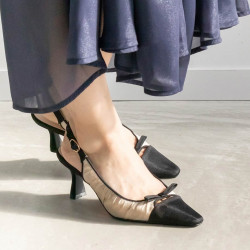
August 20, 2017
Square Pegs and Round Holes?
Marriage between Japanese men and Western women
By Anna Jassem
“Marriages of white women with Japanese men in Japan are considered unusual to the point where my husband is sometimes thought of as Chinese and complimented on his Japanese ability by fellow Japanese…The assumption is that there is no way a white girl would marry a Japanese guy,” notes one of over forty Western women surveyed for this article.
A Japanese groom and a Western bride is by far the least frequent scenario among over 20 thousand international marriages each year in Japan. The most common union involves a Japanese husband and a Chinese, Filipina or Korean wife. In fact, these three scenarios alone account for over half of all international marriages in Japan. When it comes to marriages between Japanese and Westerners, the gender pattern is reversed, the foreign spouse most typically being an American man. “These trends reflect a certain anthropological constant whereby the groom comes from the country perceived as more ‘prestigious’,” explains ethnologist Jean-Michel Butel of the French research institute on Japan, Maison Franco-Japonaise.
Contrary to Asian women, Japanese men don’t have very good press in the West. Seen as cold, workaholic, and simultaneously chauvinistic and effeminate, they are among the least desirable candidates for husbands. Likewise, Western women — perceived as more assertive and emancipated than their Japanese counterparts — are quite far from the Japanese feminine ideal.
And yet, the ladies interviewed for this article seem to be quite happy in their “unusual” relationships.
True, the reported sex life is not the most fulfilling. Over half of the foreign wives in the survey say they are “not very satisfied” or “not at all satisfied” with this aspect of their marriage and two in three would wish for more lovemaking. “My spouse and I have a very satisfactory marriage in all ways except sexually. Our sexual needs are on opposite ends of the spectrum and it has been a source of conflict, hurt, anger, and deep frustration throughout our marriage…Basically, sex is for reproduction only, as it is too ‘troublesome’ otherwise,” says one woman. Yet, there seems to be a certain degree of rationalization, with other aspects of marriage seen as compensating for an inadequate sex life. “Sex does not play a big role in marriage in Japan, I think. I had ‘my fill’ in my youth,” notes a respondent in her mid-forties. The same seems to be true for the scarce display of affection. “At the start of our marriage, his lack of outward or public affection bothered me…but, eventually, after a lot of going round with arguments and fights, I understood that he does love me very much and I don’t need him to demonstrate that publicly any more,” says a respondent with a 26-year marriage experience.
Different gender expectations may be an issue too. A number of foreign wives express disappointment at their husband’s patriarchal attitudes and the unequal division of household chores. While some contribute substantially to household income or are even primary breadwinners, they still tend to take on most housework. An Australian woman notes: “Financially, we both must work hard in order to afford our lifestyle.…Living in Japan, my husband has conflicted expectations of a wife’s role. In my home country, females are equal to their spouses, and work is expected while the male cares for the children at home.” An American respondent adds: “He tends to think he’s so much more helpful than a [traditional Japanese] husband… which he may be, but compared to a lot of friends back home, he’s just average. So I think he thinks he’s awesome and I think he’s just doing what’s normal.” Overall, half of foreign wives see different visions of marriage as a “very important” or “fairly important” cause of conflict in their marriage and 4 out of 10 say the same about differences over sharing household tasks.
There is also some frustration about the typically Japanese priority of work over family. “He thinks nothing of working long hours for low pay, as long as he has a steady job. I think as a foreigner I would not hesitate to protest such conditions to my boss, especially if they were affecting my relationship with my family,” says one wife. Another one echoes, “[For my husband,] work is of foremost importance, and leisure is afforded only at certain points of the year (live to work), whereas I enjoy leisure time and work towards freetime goals (work to live).”
Despite all these complaints, the majority of women who took the survey appear content with their relationship. Three-quarters say that they are “fairly satisfied” or “very satisfied” with their marriage in general as well as with the emotional connection with their spouse. The level of satisfaction is even higher when it comes to the intellectual connection with their partner. “While, statistically, intercultural relationships have a higher risk of failure than monocultural couples, those that survive tend to show a higher level of marital satisfaction,” comments Dariusz Skowronski, couples counsellor and psychology professor at Temple University Japan.
For most of the foreign wives, cultural differences are just “expected blips along the road.” “Two Americans or Brits or Japanese could get married and have immense cultural differences that they might not have expected. The fact that we were expecting them immediately reduced them in size and worry factor,” says one respondent. Another sums up: “I didn’t marry a nationality, I married a man.”
The survey was conducted online among members of the Association of Foreign Wives of the Japanese and K-A International Mothers in Japan. A typical respondent in this survey is a university-educated English-speaker in her early forties, having lived in Japan for an average of 17 years. The husbands too are generally well-educated, in their mid-forties and the majority have lived outside of Japan for at least a year. The couple typically has two kids, lives in a big city and enjoys a relatively comfortable financial situation. In all couples, at least one partner speaks “fluently” or “fairly well” the other’s language.







